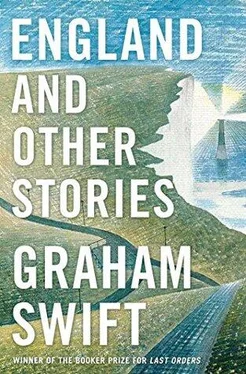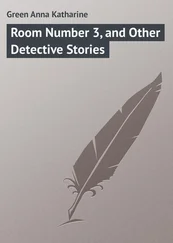Half a loaf? But isn’t this life, the whole of it? Shouldn’t I be thanking, praising heaven?
My mother used to say, ‘All good things come to an end.’ Perhaps all mothers say it. As if the worst harm she foresaw for me was the tragedy of good stuff not being constantly on tap. Lucky little brat. But she must have seen the look of abject misery on my face whenever some seaside holiday or just some happy sunny day approached its end.
There it is, there it isn’t. Now you see it, now you don’t. But now I know it’s not as simple as that. Thank heaven.
My father was a churchman, a man of God. In the war he was an RAF padre. It wasn’t a get-out card, he flew on missions too. But when others broke down, he couldn’t. He had to be their comfort. He never talked about it much, but once he said, ‘Believe me, Eric, a lot of praying went on, and it had nothing to do with me.’
When I grew up, because of my father, I used to think a lot of good things were bad things — or rather I secretly thought a lot of bad things were good. At any rate I thought: One day God will punish me, he’ll surely punish me. And he’ll surely punish me for not believing in him.
But he never did punish me. And meanwhile my mother dispensed her regular balm: ‘All good things come to an end.’ I sometimes wondered if she too really believed in God.
But look at me now, looking at someone who’s no longer there, and rehearsing a silent prayer: Please, God, let there be another time, another week. And what would my dead father think if — as God is supposed to do — he could see my every action and could see me, as I may do very soon, go up to the bedroom to touch the still-wrinkled, faintly warm sheets. To pick up a pillow and press it to my face.
I’m an osteopath. It’s my business to lay hands on people, to manipulate them, both men and women. But never, ever. Until now. There are walks of life — university lecturers, osteopaths — that must arouse the particular fears of wives, but my wife, Anthea, never had reason, nor, having Anthea, did I. I’m not unaware — this is only alertness, not vanity — that there are certain female patients, perhaps male ones too, who come to me not exactly for their back problems. But I’m saved by the clock, by the session. Time’s up — till the next time. And of course it’s in my power to say (all good things) there won’t be any next time.
But my wife died. Nearly three years ago. It was neurological. My field can border on the neurological, but I’m not a neurologist and there was nothing I could do for her. Nor, as it turned out, anything that neurologists could do for her either.
I wanted to die. I won’t pretend. I wanted to die even before she died — to be spared the fact of her death. I prayed. And after her death I wanted to die, and prayed that I might, even more.
My life was over, I went through the motions. One, two years. To steady myself, I thought of my parents, I thought of them getting through the war. All bad things. No one ever says that. My father died fifteen years ago, and my mother barely six months afterwards. There were medical reasons, but I think she died simply of my father’s death. And I wanted something similar for myself. I waited for it, willed it to happen, but I’m of sound health.
I came close to making it happen, but I’m also a coward.
Then there was Tanya. Or put it another way: I had a mental breakdown. Certainly a professional breakdown.
Lower-back pain. There’s so much of it about. I bless her lower-back pain. I bless her lower back. I bless the fact that in one so young it was something readily curable, and I could cure it. I could be her magician. Her magician!
‘There,’ I said, ‘that seems to have done it.’
And then suddenly there were tears running down my face because of the sheer delight on her face at having been so simply, quickly cured — there’d even been a little click — and at having been spared, or so I’d vouched, only more pain and interminable waiting on the NHS.
And because she was the most beautiful creature I’d ever seen and in a moment, if I wasn’t careful, I might say so. And because I was having a mental breakdown. .
And because if Anthea was watching me, as God is supposed to watch, I thought she might not wish to punish me, or even reproach me. She might even be thinking: About time, Eric, about time something like this happened. I’m even glad for you that it’s happening. Go on, Eric, seize what you can.
The truth is I didn’t even think this. I’m sure that I heard Anthea actually saying in my ear, ‘Now I won’t have to worry, Eric, and grieve for you so much. But for God’s sake stop blubbering, stop making a complete spectacle of yourself. It’s life, it’s happening. And you’re not a complete spectacle, you’re still a good-looking man. I’m frankly surprised, Eric — but I’m glad too — that nothing like this ever happened when I was alive. But you’re a free man now. I’m dead, you’re not. Go on, don’t be a bloody coward.’
All this as if she were at my shoulder, while in fact cowardly tears were rolling down my face and a partially unclad woman of extraordinary health and beauty and less than half my age was still perched on my couch, and I was saying, ‘I’m sorry, I’m terribly sorry. I was thinking of my wife — my late wife. I’m most terribly sorry. But your problem is cured. You really don’t have to see me again, but — but would you, could you do me the honour’ (and where did I get that phrase from?) ‘of having dinner with me tonight?’
I didn’t delude myself that she really thought — in spite of that click — that I was Mr Magic. With a face full of tears? Perhaps for some women charm, if I have any, is well mixed with a little vulnerability. But this was hardly vulnerability, or a little of it.
Was it naked bribery? A performance I’d somehow mustered? I don’t care. Was I about to say (some men must do this sort of thing all the time), ‘If you’ll have dinner with me I’ll forget the fee’? Or was I, before she could answer, about to cut my own legs from under me by saying, ‘I’m most frightfully sorry, but please forget all this, forget it ever happened’?
The fact is she said with a simple, quick, uncomplicated smile, ‘I’d be happy to.’ The fact is she took the box of Kleenex that I keep ready for the occasional upset patient (I’m not unfamiliar with the psychosomatic) and held a bunch of them out to me. ‘Here,’ she said.
The fact is we had dinner that evening at Zeppo’s, the very place where I used to go with Anthea and where I still had the thought: Anthea is willing me on, this is all under her aegis. And it was Anthea who’d surely warned me in the hours beforehand: Don’t go for somewhere you think is her kind of place, a young place, don’t be an idiot. Stick to what you know.
And the plain fact is that she — that is, Tanya — left my bedroom (my bedroom!) early the following morning, to return home, then to go to work. It was not yet seven. Breakfast wasn’t wanted. And I thought: Of course — she’s leaving, she’s going, that’s that. But as she made her exit, urging me not to get up, I asked the ridiculous and doomed question, ‘Will I see you again?’ And she said, with that same uncloudy voice, ‘Why not?’
I never thought to see it. A pale young body slipping through the dimness of my bedroom, like some creature glimpsed in a forest.
And of course I got up. Of course I went down, in my dressing gown, and stood, as I’m standing now, at the window. If only to tell myself that this was my home and this had really happened.
Half a loaf? So it has continued now for nearly two months. I’m not blind. I’m not, actually, foolish. It can’t last. Two months is already beyond any due allowance — whatever that might be. Is it pity? Charity? Amusement? Curiosity? I don’t mind. I don’t ask. So long as she comes. She has the power to destroy me at any moment, and maybe that in itself is the reason why she comes: the thrill of having another human soul dangling from her fingertips — a thrill that in one so young (she’s twenty-six) isn’t hampered by conscience, but a thrill that can only be consummated once, then it’s gone. One day she will open her fingers. There! Like the click of a bone in her back.
Читать дальше












